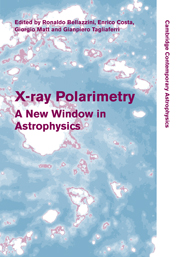Book contents
- Frontmatter
- Contents
- List of contributors
- Preface
- 1 X-ray polarimetry: historical remarks and other considerations
- Part I Polarimetry techniques
- Part II Polarized emission in X-ray sources
- Part III Future missions
- 37 Gravity and Extreme Magnetism SMEX (GEMS)
- 38 Programs of X-ray polarimetry in Italy
- 39 A polarimeter for IXO
- 40 Polarimetry with ASTRO-H soft gamma-ray detector
- 41 The Energetic X-ray Imaging Survey Telescope and its polarization sensitivity
- 42 PoGOLite: a balloon-borne soft gamma-ray polarimeter
- 43 Studies of neutron background rejection in the PoGOLite polarimeter
- 44 Observing polarized X-rays with PoGOLite
- 45 Pre-flight qualification tests of the PoGOLite detector system
- 46 The Gamma-RAy Polarimeter Experiment (GRAPE) balloon payload
- 47 POLAR: an instrument dedicated to GRB polarization measurement
- 48 Polarization detection capability of GRIPS
- 49 X-ray and γ-ray polarimetry small-satellite mission PolariS
- 50 GAP aboard the solar-powered sail mission
- 51 Hard X-ray polarimeter for small-satellite missions
- 52 Performance of hard X-ray polarimeter: PHENEX
- 53 GRB polarimetry with POET
- Author index
- Subject index
47 - POLAR: an instrument dedicated to GRB polarization measurement
from Part III - Future missions
Published online by Cambridge University Press: 06 July 2010
- Frontmatter
- Contents
- List of contributors
- Preface
- 1 X-ray polarimetry: historical remarks and other considerations
- Part I Polarimetry techniques
- Part II Polarized emission in X-ray sources
- Part III Future missions
- 37 Gravity and Extreme Magnetism SMEX (GEMS)
- 38 Programs of X-ray polarimetry in Italy
- 39 A polarimeter for IXO
- 40 Polarimetry with ASTRO-H soft gamma-ray detector
- 41 The Energetic X-ray Imaging Survey Telescope and its polarization sensitivity
- 42 PoGOLite: a balloon-borne soft gamma-ray polarimeter
- 43 Studies of neutron background rejection in the PoGOLite polarimeter
- 44 Observing polarized X-rays with PoGOLite
- 45 Pre-flight qualification tests of the PoGOLite detector system
- 46 The Gamma-RAy Polarimeter Experiment (GRAPE) balloon payload
- 47 POLAR: an instrument dedicated to GRB polarization measurement
- 48 Polarization detection capability of GRIPS
- 49 X-ray and γ-ray polarimetry small-satellite mission PolariS
- 50 GAP aboard the solar-powered sail mission
- 51 Hard X-ray polarimeter for small-satellite missions
- 52 Performance of hard X-ray polarimeter: PHENEX
- 53 GRB polarimetry with POET
- Author index
- Subject index
Summary
POLAR is an instrument designed to measure polarization of gammaray bursts (GRB). The concept is based on building the simplest and the smallest possible instrument that can perform this measurement properly. Compton scattering is used. Energy measurement and localization of the GRB is performed only at a level sufficient to maintain the systematic errors at an acceptable level. If the information of the GRB spectrum and of the GRB localization is known by other means, it could be used to reduce further the systematic errors. The instrument is very light and very compact but has enough acceptance to enable measurement of more than 10 GRB per year with a systematic error less then 10%.
Introduction
Polarization of the prompt signal is a key ingredient to understand the gammaray-burst phenomenon. In fact very different scenarios (for example Poyntingflux-driven or baryon-driven models) differ widely on the predicted polarization level and, at the same time, agree on most of the other measurable parameters.
The bulk of the energy in the prompt signal of GRB is emitted around 100 keV so this is the part of the spectrum that contains the most valuable information. At this energy, the Compton effect dominates. Fortunately the Compton cross section is dependent on the incoming photon polarization, being maximal for scattering angles perpendicular to the polarization direction.
The desirable features for a GRB polarimeter are:
It should be a space instrument because gamma-rays do not penetrate the atmosphere.
It should feature a large angular dependence to collect as many GRB as possible.
[…]
- Type
- Chapter
- Information
- X-ray PolarimetryA New Window in Astrophysics, pp. 322 - 326Publisher: Cambridge University PressPrint publication year: 2010
- 1
- Cited by



